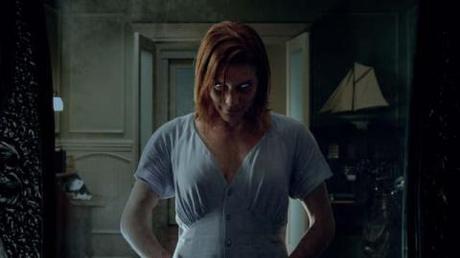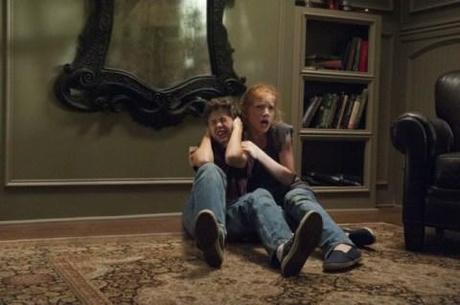
by Steve Habrat
In 2009, Hollywood revived the supernatural horror film with Paranormal Activity, the “found footage” hit that spawned four lucrative sequels. While the Paranormal Activity series has rapidly descended into a bloated cash grab, the upside is that it shifted America’s attention away from the torture porn craze and the disastrous Saw franchise. Since 2009, the ghostly scares of Paranormal Activity have drifted into other, better horror movies that have scared the pants off moviegoers, and audiences just haven’t been able to get enough. Most recently, the biggest hit has been last summer’s The Conjuring, the retro haunted house blockbuster that turned out to be one of the spookiest horror movies of recent memory. Now, less than a year after The Conjuring haunted movie theaters, comes director Mike Flanagan’s Oculus, a micro-budgeted effort that boasts a clever script, careful pacing, and some hair-raising moments of terror that don’t rely on loud blasts of music to send you to the ceiling. While some impatient viewers may find the mind-bending Oculus way too slow for their instant gratification taste, the snail’s-pace at which the film moves really mounts the tension and allows the filmmakers to play with the viewer’s mind.
Oculus begins in the present day, with twenty-one year old Tim Russell (played by Brenton Thwaites) being released from a mental institution after serving eleven years for the murder of his father, Alan (played by Rory Cochrane), after he witnessed him murder his mother, Marie (played by Katee Sackhoff) and attempt to kill his older sister. Simultaneously, Tim’s older sister, Kayie Russell (played by Karen Gillan), has been tracking down an ominous mirror that had once hung in their father’s home office, and that is believed to have caused a string of bizarre mental breakdowns and deaths everywhere it has hung. Desperate to prove that Tim was innocent of the murder, Kaylie devises an experiment to prove to the authorities that their father didn’t just snap—that there are supernatural forces that emerge from the mirror and drive anyone nearby out of their mind. Reluctantly receiving help from Tim, Kaylie begins trying to prove her theory about the mirror and the murder, but the supernatural forces appear to be laying dormant, at least at first. As the night goes on, reality begins to distort, ghostly apparitions appear, secrets from that horrific night are uncovered, and the sibling’s sanity is pushed to the breaking point.
Much like The Conjuring, Oculus is far from a lazy horror film. It doesn’t simply rely on loud noises or fake-out scares to get a jump from the audience. (There isn’t one loud bang or deafening musical cue to be found.) It has faith in its visual scares, which range from roaming apparitions with eyes like mirrors to more standard gore fare like ripped out fingernails, oozing C-section scars, and one character accidentally biting into a light bulb rather than the apple that they were previously snacking on. Nearly all of it nabs the groans that it is out to elicit, especially every single scene involving some sort of fingernail mutilation. (Flanagan must have a thing for it much like Italian horror director Lucio Fulci had a fetish for eye mutilation.) While the visual scares do have spunk, the distorted realities and unraveling mysteries that make up the center of Oculus are what really have the audience gripping their armrests. Flanagan masterfully flits between past and present, allowing the events of both to mesh together to the point where the audience isn’t sure what are the mirror’s demonic tricks and what is reality. What makes it even more nerve-racking is the fact that it remains strictly in the confines of Russell home. There is nowhere to run except up the stairs, and there is nowhere to hide except for the bathroom or the closet.

While the slow pace is sure to bore the pre-teens in the back row, where the yawns really stem from are the lifeless performances from our leads. Gillan’s Kaylie hurries around with wide eyes and muttering cryptic remarks to her husband about how everything will be all right once she confronts this mirror. Things improve slightly with Thwaites, who tries to rationalize the events that took place eleven years earlier, but he largely disappears into the sea of new up-and-coming actors all looking to be the next Taylor Lautner—who he shares a mild resemblance with—or Robert Pattinson. Together, Gillan and Thwaites are a ball of forced trauma, as they carry out rehearsed bickering over the mirror and it’s rumored supernatural powers. To make things worse on the two leads, they manage to be overshadowed by the younger versions of themselves, portrayed strongly by Garrett Ryan and Annalise Basso. Then there is Rory Cochrane’s terrifying turn as Alan, the sibling’s deranged, cherubic-faced father who wanders around the home aiming a pistol and warning the children, “I have seen my demons and they are many. I have seen the devil and he is me.” He’s an overwhelmingly dark and erratic presence as the mirror’s spirits guide him around the shadows and seduce him into evil. Rounding out the main cast is Sackhoff’s Marie, the distraught mother who is convinced that Alan is having an affair and who predictably drowns her sorrows in bottle after bottle of wine. Her performance does have some bite (despite her missing teeth) when she endures Alan’s torture, which includes chains and a broken plate.
What ultimately sets Oculus apart from a good majority of horror movies today is the way it resists the temptation to constantly pay homage to classic supernatural horror movies that came before it. It’s not bogged down by tips of the hat, which usually tickle those in the audience with extensive knowledge of the horror genre. (I confess to be one of these individuals that is charmed by a sly homage or geeky reference.) This reluctance to constantly pay tribute allows the flow of the film to remain uninterrupted and leaves Oculus feeling strangely refreshing in a genre that thrives on name familiarity. The film also excites through its brainy script, co-written by Flanagan and Jeff Howard, who really understand that confusion and disorientation can really up the tension levels. It’s a constant guessing game with Oculus, and it becomes increasingly absorbing as it unfolds. Where Flanagan and Howard go wrong—and you have to wonder if there wasn’t studio pressure here—is with the climax of the film. It leaves the door wide open for a sequel, and it hints that the studios are crossing their fingers for another cash cow series that will make money on (*gulp) name familiarity. Overall, it’s plagued by a handful of flaws and it may not be quite as scary or entertaining as James Wan’s The Conjuring, but Oculus is still a shrewd little horror movie that suggests that director Mike Flanagan is a talent to keep an eye on.
Grade: B
